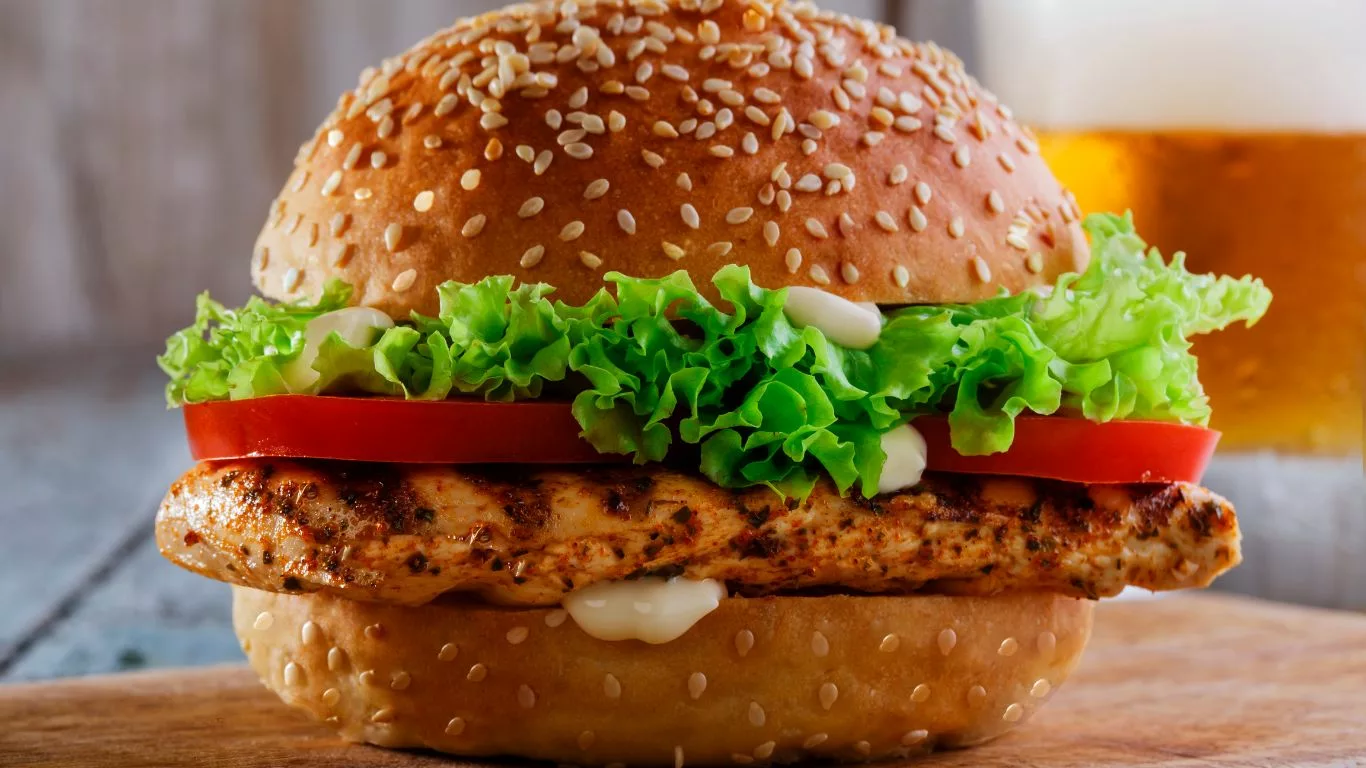GERD Triggers in Processed Foods – What You Need to Know
Learn how processed foods can be GERD triggers, which foods to avoid, and tips for managing your acid reflux with a balanced diet.
If you’ve been dealing with GERD (gastroesophageal reflux disease) for a while, you probably know that some foods can send your symptoms into overdrive. Unfortunately, many of these culprits are hiding in the processed foods we consume daily. In this article, we’ll dive into the common GERD triggers found in processed foods and offer some practical tips to help you manage your condition better. No need to stress—let’s break it down, one bite at a time.

What is GERD and How Do Processed Foods Play a Role?
First things first—GERD is a chronic condition where stomach acid frequently flows back into the esophagus, leading to symptoms like heartburn, regurgitation, chest pain, and sometimes difficulty swallowing. The culprits? Things like spicy foods, alcohol, and even chocolate can trigger those unwanted flare-ups. But here’s the kicker—processed foods are often sneakily packed with ingredients that can make your GERD symptoms worse.
Now, you might be wondering—how exactly do processed foods affect GERD? Well, processed foods often contain preservatives, additives, unhealthy fats, and high levels of sodium, all of which can relax the lower esophageal sphincter (LES), the valve that keeps stomach acid from rising into the esophagus. When the LES is weakened, acid reflux becomes more likely. Yikes!
Common Processed Foods that Trigger GERD
Processed foods can be tricky, and not all of them are obvious offenders. You might think that only the spicy or greasy stuff is to blame, but it’s often the hidden ingredients in everyday snacks and meals that cause the most trouble. Let’s take a look at some of the biggest GERD triggers lurking in processed foods:
1. Fried Foods
It’s no secret that fried foods are loaded with fat. While this makes them delicious, it also makes them a prime culprit for triggering GERD symptoms. Why? Fatty foods tend to relax the LES, allowing stomach acid to flow back into the esophagus. Plus, fried foods are hard to digest, which can lead to bloating, discomfort, and, you guessed it, heartburn.
Examples: French fries, fried chicken, doughnuts, and onion rings.
2. High-Sodium Snacks
Processed foods are often packed with salt to enhance flavor and preserve shelf life. Unfortunately, too much sodium can increase your risk of acid reflux by causing the body to retain water and increase stomach acid production. If you’re munching on salty snacks like chips, pretzels, or crackers, you might want to consider cutting back.
Examples: Potato chips, salted nuts, packaged popcorn, and pretzels.

3. Processed Meats
Another common offender is processed meats like sausages, hot dogs, and deli meats. These meats are high in fat and often contain preservatives like nitrates, which can irritate the esophagus and contribute to GERD flare-ups. Even though these meats might seem like an easy snack or lunch option, they’re best avoided when you’re managing GERD.
Examples: Salami, bacon, hot dogs, and pepperoni.
4. Sugary Foods and Sodas
Processed sugars are a big deal when it comes to GERD. Not only do sugary foods like candy, cakes, and pastries cause weight gain (which can also exacerbate GERD symptoms), but they can also trigger acid production in the stomach. Sugary drinks, especially sodas, are another no-go because they’re carbonated and can cause bloating, which puts extra pressure on the stomach and LES.
Examples: Soda, sugary cookies, cakes, candy, and pastries.
5. Artificial Sweeteners
It might seem like a healthier alternative, but artificial sweeteners (found in sugar-free foods, drinks, and gum) can actually contribute to acid reflux. These sweeteners can upset the digestive system and even promote bloating, making it easier for stomach acid to leak into the esophagus.
Examples: Sugar-free gum, sugar-free soda, sugar-free desserts.

How to Manage GERD with Processed Foods
So, now you know which processed foods to steer clear of, but what can you do to keep GERD under control without giving up all your favorite foods? Here are some tips to help you navigate the world of processed foods and still manage your symptoms effectively:
1. Read Labels Carefully
Processed foods often contain hidden ingredients that can trigger GERD, so it’s essential to read food labels. Look for high levels of sodium, unhealthy fats (like trans fats), and artificial additives. Opt for products that are lower in fat, salt, and sugar to minimize the chances of irritating your stomach.
2. Choose Whole, Unprocessed Alternatives
Instead of reaching for processed meats, why not go for lean, fresh proteins like chicken, turkey, or fish? Similarly, swap out those salty, greasy snacks for fresh fruits, veggies, and whole grains. Whole foods are easier on your digestive system and are less likely to cause acid reflux.
3. Focus on Smaller, Frequent Meals
Eating large meals puts pressure on the stomach, making it more likely for acid to spill over into the esophagus. Try to eat smaller meals more frequently throughout the day. This way, you’re still getting the nutrition you need without overloading your stomach.
4. Avoid Eating Late at Night
Processed foods late at night are a recipe for disaster. When you eat right before bed, your stomach has to work overtime to digest, which can lead to acid reflux while you sleep. Aim to eat your last meal at least 3 hours before lying down to give your body time to digest properly.
Conclusion
GERD can be a challenge, but by being mindful of the processed foods you consume, you can make a huge difference in how you feel day-to-day. Avoiding trigger foods like fried snacks, processed meats, sugary treats, and high-sodium foods is key to managing your symptoms. By focusing on whole, unprocessed alternatives and adopting healthy eating habits, you can reduce the frequency and severity of your GERD flare-ups. Take control of your health—your stomach (and esophagus) will thank you!
Appendices
FAQs
- Can I ever eat processed foods if I have GERD? While it’s best to avoid certain processed foods, you can still enjoy them in moderation. Just be mindful of triggers and focus on healthier alternatives.
- What’s the best type of diet for managing GERD? A diet rich in whole foods, including vegetables, fruits, lean proteins, and whole grains, is ideal for managing GERD.
- Can I drink soda with GERD? Soda can aggravate GERD due to its carbonation and acidity, so it’s best to avoid it, especially if you’re prone to flare-ups.
- Are there any processed foods I can safely eat with GERD? Look for processed foods with no added preservatives, artificial sweeteners, or high levels of fat. Always check labels for hidden triggers.
- Does GERD go away on its own? GERD is a chronic condition, but with proper management and lifestyle changes, you can significantly reduce symptoms.
- Is it safe to eat fast food with GERD? Fast food is typically high in fat and sodium, which can worsen GERD symptoms. Opt for healthier, homemade alternatives whenever possible.
- Can stress cause GERD symptoms? Yes, stress can make GERD worse. Stress management techniques like yoga and deep breathing can help reduce symptoms.
- How does alcohol affect GERD? Alcohol can relax the LES and increase stomach acid production, so it’s wise to limit alcohol consumption if you have GERD.
- Can stress make GERD worse? Yes, stress can trigger acid reflux. Managing stress through relaxation techniques and exercise can help reduce GERD symptoms.
- What are the best drinks for GERD sufferers? Non-citrus, non-carbonated drinks like herbal teas, water, and almond milk are gentle on the stomach and less likely to trigger GERD symptoms.
References
- American Gastroenterological Association (AGA). (2023). GERD and its Management. Read Article
- Smith, J., & Brown, T. (2021). Managing GERD Through Diet. Journal of Digestive Health, 45(4), 230-240. Read Article
- National Institutes of Health (NIH). (2024). GERD: Causes and Management. National Digestive Health Report, 32(1), 15-20. Read Article
Disclaimer
Disclaimer: The information provided in this article is for educational purposes only and does not substitute for professional medical advice. Always consult with your healthcare provider regarding any concerns about your GERD or dietary restrictions. Individual needs may vary, and professional guidance is crucial for personalized care.

Camellia Wulansari is a dedicated health writer specializing in digestive disorders, contributing valuable insights and information to the health and wellness community. With a passion for promoting well-being through knowledge, Camellia serves as a reliable source of expert content on healthusias.com.






